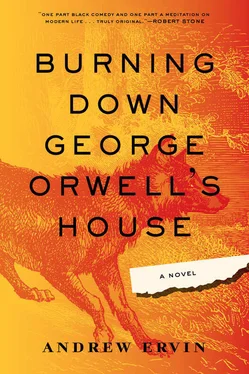“So you admit that you lied to me?”
“Don’t you understand? I was trying to protect Molly. I would never do anything untoward—”
“Trying to protect your own arse is more like it. You assume that I gave her the black eye?”
“Who’s lying now? Who else would’ve done such a thing?”
“This isn’t about me, Chappie, or how I choose to raise my own daughter. It’s about some bloody Yank who shows up out of the blue to bless us with his presence and is so fucking smart that he thinks a teenage girl is better off living in his house than at home with her own loving da.”
Ray couldn’t think straight. He sorted through the rush of ideas overheating his synapses, looking for a kernel of logic or wisdom that might take the form of something meaningful to say, something that might help him find some clarity and, if possible, save Molly’s skin and his own. He managed to take a deep breath. The sea air tasted bitter with salt. “There is no way,” he said, “that I will send her back to you to get physically abused. She doesn’t have to stay at Barnhill, but I’ll contact the proper authorities and find her someplace safe.”
“She’s my daughter for fuck’s sake! I will discipline the little bitch in whatever manner I, as her father, see fit to do. If anything, she has a smack coming for all the worry she’s caused me. Look around you, Chappie. There’s not one fucking thing you can do about it.”
Ray leapt from the bench with the intention of tossing Pitcairn off the back of the boat, but the moment he stood the motor came to life and sent him toppling into the water. The cold sea filled his nose and mouth. He couldn’t tell down from up until the weight of his body tugged him lower. The bubbles of his own breath rushed upward as if to save themselves. The tide pulled at his clothes and dragged him one direction or another. Seaweed and debris gyred around him until he managed to claw to the surface. He pulled a bit of air in and stayed afloat long enough to untie his boots. He kicked them off and they sank like expensive, leathery sacrifices to the gods and their spoiled children.
The sight of the Paps helped Ray regain a sense of direction. He treaded water long enough to watch Pitcairn return to the shore. He swam for it, but the dock never got any closer. Pitcairn lifted the destroyed bicycle from the back of his truck, carefully removed his panniers, and tossed the frame into the water. He threw the boxes from The Stores to the ground and then the truck evaporated into the distance.
The wet bandages around Ray’s head made it difficult to see so he ripped them off. The undertow tugged at the legs of his trousers, but he didn’t want to remove them because one pocket was stuffed with the cash he had brought to cover the expenses in Craighouse. He grew tired though and soon had no choice. He unbuttoned his pants, their pockets full of sterling, and let them sink.
It took an hour to crawl ashore. He lay on his back — in his underwear — and caught his breath while the sun approached the horizon. The beach was made out of dull, round stones instead of sand. The tips of the Paps were lit up with the sun’s last rays. A cold breeze swept over his skin. It would be dark soon and there were unidentified wild animals prowling the island. Possibly wolves. He was drenched, exhausted, humiliated, and the extreme thirst exacerbated the effects of his concussion.
Molly was probably sporting a new black eye or two already, but all Ray wanted to do was sleep. Find a cozy shrubbery and climb underneath for the night, for the rest of his miserable life. Yes, everyone had been right — he was miserable. Sleeping half naked and shivering amid a field of sheep sounded better than going home to an empty house and the knowledge that Molly had been dragged away against her will and beaten up again by her father. Yet he wandered home in the dark, the stacked boxes punishing the muscles of his arms. The shame irritated him as much as the wet underpants. His socked feet ached. The numbness started as a static-like tingle in his toes and fingers, then grew with each step. Something like shock or hypothermia sought to introduce itself to his nervous system. He made it to the back garden more by blind luck than through any understanding of the geography.
Several of the lights were on at Barnhill and Ray saw movement inside, or thought he did. The front door was unlocked. Another vivisected animal sat in a pile at the front door. He ran inside.
“Molly?” he yelled. He marched through the house, still without pants on. “Molly?”
No answer.
He went to the kitchen, poured a big dram of scotch, and carried it upstairs. The door to her room — or what had been her room — was closed. He poked his head in. All of her things were strewn around, including her paintings. He took the opportunity to examine her work up close. The extent of her artistic talent came as a surprise. He lingered over the self-portrait that she had been so careful to keep hidden. The thick brushwork conveyed a kind of aggression, like she couldn’t get the paint on the canvas fast enough, but there was nothing haphazard about its application. The subtlety of her color palette — a thousand shades separating grey from blue — insisted upon a slow appraisal. He could look at her facial expression all night and never come to learn its depths. In the portrait, Molly had captured some sad understanding about herself that no teenage kid should have. Ray carried it to his bedroom. He took down a watercolor and hung Molly’s bruised and naked image in its place.
The doors chimed to signal his arrival. Mrs. Kletzski sat on a stool behind the counter staring at her television screen. Through the tinny warble of the built-in speakers, the talk show sounded like a domestic dispute conducted through faulty bullhorns.
“Hello, Mrs. Kletzski.” Nothing. “Hello, Mrs. Kletzski!”
“Raymond, where have you been hiding?” She didn’t turn the volume down and had to yell over a commercial for a budget airline. The racks behind her, typically full of plastic-sheathed clothes, were all but empty. Only a few suits, dresses, and laundry sacks remained.
“I was here on Saturday, Mrs. Kletzski.”
“Do you have your ticket?”
“No, Mrs. Kletzki, I’m sorry. I don’t.”
“Let me see if I can find your slip!” She kept her receipts in a tall metal box with cardboard tabs for each letter of the alphabet. She flipped through each of them. “Let me see here,” she said. “I’m not responsible for garments left over six weeks!”
“It’s only been two days, Mrs. Kletzski.”
“They drop off their clothes — wedding dresses! — and leave them here like I’m supposed to look after them. What are they saving them for? Their second marriages? So do you know what I did?”
“What’s that, Mrs. Kletzski?” He needed coffee.
“When I got back from church yesterday, I rented two dumpsters and took everything that was here for longer than six weeks and threw it out back.”
“Did you call the people? Maybe they just forgot.”
“I’m not responsible for garments left over six weeks! Here’s your ticket. Says so right here! I let the bums come and take it all. Kept the hangers though — I can use those again!”
“Smart thinking. What do I owe you?”
Her show came back on and distracted her. She punched some numbers into the old cash register and the drawer opened with a cha-ching . “Twelve dollars and fifty-five cents.” She placed his credit card in a plastic tray and slid a bar over it to produce a three-ply impression and he signed the one on top. She handed him a carbon copy and went to retrieve his things. “Welter! What day is today?”
Читать дальше












